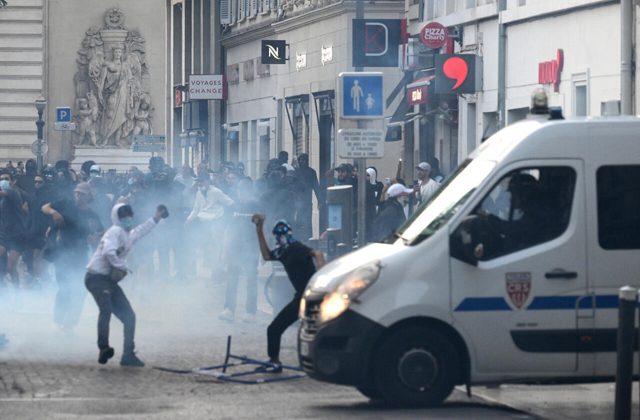
NANTERRE, France, July 1, 2023 (BSS/AFP) - Sporadic violence and looting hit several cities across France in a fourth night of protests after the fatal police shooting of a teenager, but it was much less intense than previously, authorities said early Saturday.
France deployed 45,000 officers backed by light armoured vehicles, while crack police units and other security forces fanned out across the country to quell violence over the death of Nahel, who was killed during a traffic stop in a Paris suburb on Tuesday.
Despite the security presence, looting took place Friday night in the cities of Lyon, Marseille and Grenoble, with bands of often hooded rioters pillaging shops.
Protesters also set fire to cars and trash bins.
But during a visit to Mantes-la-Jolie west of Paris, Interior Minister Gerald Darmanin said early Saturday morning that the night's violence had been of "much less intensity", with 471 arrests nationwide and pockets of tension in Marseille and Lyon in particular.
Darmanin had announced an "exceptional" mobilisation of police and gendarmes to avoid a fourth consecutive night of riots over the death of Nahel, who will be buried on Saturday in the Paris suburb of Nanterre where he lived and was killed.
The family's lawyers asked journalists to stay away, saying it was "a day of reflection" for Nahel's relatives.
Dozens of police vans were positioned not far from the entrance to the Vieux Pont district of Nanterre, which was the epicentre of the unrest.
The French national football team joined calls for an end to the violence.
"The time of violence must give way to that of mourning, dialogue and reconstruction," the team said in a statement posted on social media by captain and Paris Saint-Germain superstar Kylian Mbappe.
Les Bleus said they were "shocked by the brutal death of young Nahel" but asked that violence give way to "other peaceful and constructive ways of expressing oneself".
- Marseille clashes -
The southern port city of Marseille was again the scene of clashes and looting from the centre and further north in the long-neglected working-class neighbourhoods that President Emmanuel Macron visited at the start of the week.
Around 2:00 am, Marseille police said they had made 88 arrests overnight of often masked and "very mobile" young people accused of looting or trying to.
A major fire "linked to the riots" broke out in a supermarket, according to a police source.
Looting and clashes between hooded protesters and police also occurred in parts of Grenoble, Saint-Etienne and Lyon, while in the western region in Angers and Tours there were only a few groups facing the police.
The Paris region was not spared the flames, with Colombes in the northwest suburbs enveloped in a strong smell of burning and with firefighters there extinguishing a car that had been set alight, according to an AFP journalist at the scene.
In Nanterre, nine people were arrested carrying jerry cans and Molotov cocktails.
In Saint-Denis, an administrative centre was affected by a fire, and in Val-d'Oise, the Persan-Beaumont town hall and municipal police station caught fire and were partly destroyed.
Buses and trams, targeted in some of the previous nights' violence, stopped running at 9:00 pm Friday and the sale of large fireworks and inflammable liquids has been banned.
Prime Minister Elisabeth Borne also announced the cancellation of large-scale events across the country. Two concerts by popular singer Mylene Farmer at the Stade de France planned for Friday and Saturday were among the write-offs.
- 'Unacceptable exploitation' -
Macron urged parents to take responsibility for underage rioters, one-third of whom were "young or very young".
He also denounced the "unacceptable exploitation of a death of an adolescent" in some quarters and vowed to work with social networks to curb "copycat violence" spread via services such as TikTok and Snapchat.
Macron has attempted to strike a balance between pressure for a harsh response and fears of triggering a stronger backlash.
The unrest has raised concerns abroad, with France hosting the Rugby World Cup in the autumn and then the Paris Olympic Games in summer 2024.
Britain and other European countries have updated their travel advice to warn tourists to stay away from areas affected by the rioting.
The French tourism industry has expressed concern over the unrest, with hotels and restaurants facing cancellations.
"Our hotel members have suffered a wave of cancellations of reservations in all the territories affected by the damage and clashes," said chef Thierry Marx, president of the main association for hotel and catering industry employers.
The unrest was sparked by the killing of 17-year-old Nahel, which revived longstanding grievances about policing and racial profiling in France's low-income and multi-ethnic suburbs.
France has been rocked by successive nights of protests since the teenager was shot at point-blank range during a traffic stop captured on video.
In her first media interview since the shooting, Nahel's mother, Mounia, told France 5 television on Thursday: "I don't blame the police, I blame one person: the one who took the life of my son."
She said the 38-year-old officer responsible, who was detained and charged with voluntary manslaughter, "saw an Arab face, a little kid, and wanted to take his life".
The UN rights office said Friday that the killing of the teen of North African descent was "a moment for the country to seriously address the deep issues of racism and racial discrimination in law enforcement".
A foreign ministry statement dismissed that charge as "totally unfounded".